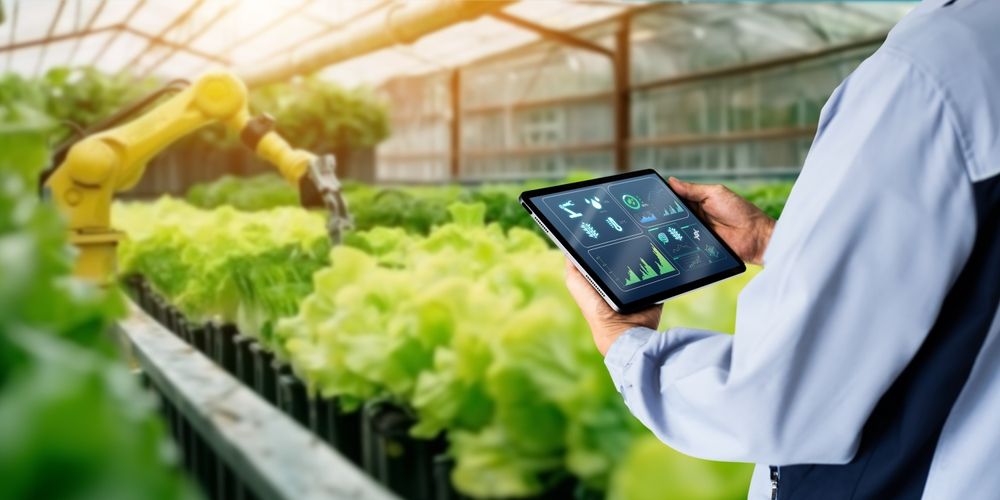Exploring New Technologies and Their Impact on Gardeners and the Businesses Supplying Them - Speaker Spotlight: Glee 2024
)
 |
Dave Denny is the Horticultural Trades Association's (HTA) Director of Research and Insights. Having been at the HTA for 14 years, his responsibilities include leading the teams which scan the horizon looking at the trends that have the potential to disrupt the industry or have a fundamental impact on opportunities and threats facing members. Prior to joining the HTA Dave has worked in various public sector and commercial market research and commercial roles in the fields of education, technology, and charity. |
In recent years, the horticulture industry has witnessed rapid advancements driven by technology. From consumer behaviour to business operations, the intersection of horticulture and technology is shaping the future of gardening.
At Glee 2024, Dave Denny, Director of Research and Insights at HTA (Horticultural Trades Association), spoke about the evolving dynamics within the horticulture industry, highlighting how both businesses and consumers are adapting to these changes.
A Changing Demographic
Gardening has traditionally been an activity favoured by older generations, and the trend continues today. This is not surprising, as gardening requires time and patience, which are often more accessible to older individuals. However, it's important to note that even younger generations are becoming increasingly interested in gardening, with about one in four individuals outside the older demographic regularly engaging in gardening activities.
A significant question is how different age groups consume information about gardening. The HTA runs an annual consumer survey, and data reveals that social networking sites and online videos have become essential sources of information for younger gardeners. Social media platforms like TikTok and Instagram are particularly popular among the 25-45 age group. In contrast, older gardeners still favour platforms like YouTube for tutorials and ideas.
However, despite the popularity of digital channels, traditional sources such as family and friends remain highly influential. Gardening remains a multi-generational activity, with younger individuals often seeking advice from older family members. This cross-generational link offers significant opportunities for the horticulture industry to foster relationships and create products that appeal to both older and younger generations.

The Growing Importance of Digital Platforms
One of the standout findings from the HTA’s consumer survey is the rise in digital engagement across all age groups. Online videos and social networking sites have seen steady growth as sources for gardening tips and ideas. Even among older gardeners, online videos are widely consumed, with one in ten individuals over 75 years old using these resources.
Garden centres also play a crucial role in providing gardening information. Their websites are increasingly being used as valuable resources for gardening ideas, especially among core gardening demographics. The opportunity for garden centres to curate content from platforms like YouTube or social media, and tailor it to their audience, cannot be understated. The digital presence of garden centres has evolved from being merely an online shop to an essential component of the overall gardening experience.
Shifting Consumer Preferences in Purchasing
While digital channels are now critical for gathering information, they are also becoming essential for purchasing garden products. The survey found that approximately 11% of outdoor plant purchases are now made online, a figure that has remained steady since the pandemic. This represents a substantial market, amounting to about £200 million in sales transacted online.
In other gardening categories, such as garden furniture, online purchases make up an even larger share of sales. Approximately 40% of all garden furniture sales occur online. This shift highlights the importance for businesses to establish a robust online presence to capture a significant portion of the market.
Challenges Facing the Horticulture Industry
Despite the promising opportunities presented by technology, the horticulture industry faces several challenges, particularly in terms of rising costs. The cost pressures on businesses have increased dramatically due to labour shortages, rising wage demands, and other input costs such as energy, water, and fertilisers. For example, the cost of fertilisers remains about 40-50% higher than pre-Ukraine crisis levels, placing immense financial strain on growers.
Another challenge is the growing complexity of cross-border trade, particularly following Brexit. Importing plants and materials has become a labour-intensive and time-consuming process, further driving up costs for businesses. These challenges require businesses to adopt new technologies and streamline operations to remain competitive in a rapidly evolving market.
Sustainability and Consumer Expectations
Sustainability has become a top priority for both businesses and consumers in the horticulture industry. According to the HTA’s consumer research, 82% of consumers believe it is important or very important that garden centres and brands are environmentally friendly. However, only 46% of consumers believe that the industry is meeting these expectations. This gap highlights the potential for businesses to improve their environmental practices and communicate their efforts more effectively to consumers.
Interestingly, the garden industry fares much better in consumer perceptions of sustainability compared to other industries such as fashion. While only 8% of consumers think that fashion retailers are environmentally friendly, the garden sector enjoys a more favourable reputation. This gives horticultural businesses a significant advantage, as consumers see them as partners in promoting environmentally friendly practices.
Value of Sustainability in Gardening Products
One of the key findings from a recent HTA study on consumer attitudes toward plants is that while consumers expect environmentally friendly products, they are not necessarily willing to pay a premium for them. The research employed a conjoint analysis, where consumers had to make trade-offs between different plant features, such as size, price, and sustainability credentials like peat-free or pollinator-friendly.
The results showed that while consumers appreciate sustainable features, these are often viewed as baseline expectations rather than added value. A 5% price increase, for example, would result in a 15% decline in sales, even if plants had multiple sustainable features. This suggests that businesses need to absorb some of the costs of sustainability rather than passing them entirely onto consumers.
Moreover, consumers are willing to "punish" brands that do not meet their sustainability expectations. Plants labelled with an eco-rating of “E,” for example, saw a noticeable decline in sales. This illustrates the high stakes for businesses in maintaining their reputation for environmental friendliness.

Technological Innovations in Horticulture
To address the twin challenges of sustainability and productivity, the horticulture industry is increasingly turning to technology. One exciting development is the use of robotics and artificial intelligence (AI) in plant production. Dave from the HTA discussed a robot developed by Claas that uses AI to distinguish between weeds and desirable plants, reducing the need for chemicals by zapping weeds with intense light. This robot is solar-powered, making it both energy-efficient and environmentally friendly.
While this technology is still in its early stages, it has the potential to revolutionise horticulture by reducing labour costs and improving sustainability. The use of robots in horticulture could extend beyond field production to glasshouse environments, offering further opportunities for automation in the industry.
Another exciting technological advancement is the use of AI in market research. The HTA has successfully used AI-driven tools to gather consumer insights quickly and at a fraction of the cost of traditional methods. This type of innovation allows businesses to be more agile in responding to consumer preferences, improving product design, and refining marketing strategies.
The Role of HTA in Supporting the Industry
The HTA plays a vital role in helping horticultural businesses navigate these challenges and take advantage of new opportunities. One of its key initiatives is to lobby the government for continued investment in horticulture. With the industry’s potential to deliver social and environmental benefits, including promoting health and combating urban heat islands, the HTA is working to secure funding and support for capital investments in areas like automation, energy efficiency, and water conservation.
In addition to advocacy, the HTA provides practical resources for its members, such as advice on extended producer responsibilities, cross-border trade, and sustainability initiatives. The association also facilitates knowledge sharing and networking opportunities among its members, allowing businesses to learn from each other and improve their operations.
The horticulture industry is undergoing a period of rapid transformation, driven by both technological innovations and changing consumer expectations. While these changes present significant opportunities for businesses, they also pose substantial challenges, particularly in terms of rising costs and sustainability pressures.
To remain competitive, horticultural businesses must embrace technology, both in their interactions with consumers and in their internal operations. From online sales platforms to AI-driven market research and robotic weed control, the future of horticulture lies in harnessing the power of technology to drive efficiency, sustainability, and growth. With the support of organisations like the HTA, the industry is well-positioned to meet these challenges and continue thriving in the years to come.
Share your insights on growing techniques, plant care, landscaping, sustainable gardening or anything green-thumb-related with an audience eager to learn. We’re looking for guest contributors to share their thoughts with Glee. Whether you're a seasoned horticulturist or a retailer in the sector, your voice is welcome!
Submit your articles today and inspire fellow gardening retailers!
